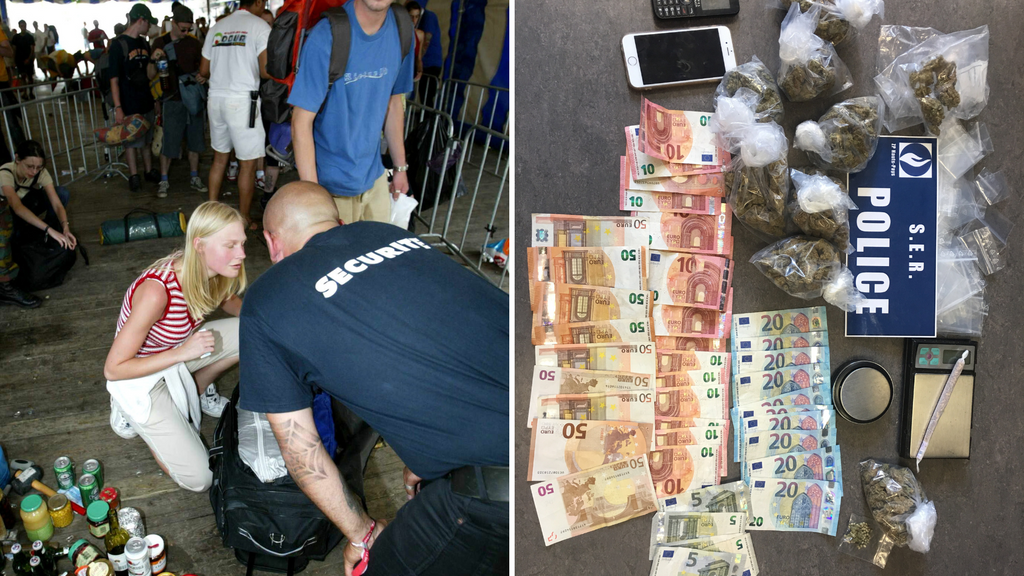For some, drug consumption and musical festivals are almost synonymous. Each year, hundreds of kilos of narcotics are seized at festivals across the country, but just as many are not.
Festival organisers, and to some degree local police, tread a delicate line between enforcement and safety. Whilst almost all festivals have an explicit zero-tolerance policy to drug consumption, this is difficult to enforce with attendance often in the tens of thousands.
Not only is a heavy-handed approach to preventing drug use impracticable on such a large scale, it would be counter to the spirit of the festivals themselves.
A more sensible tactic has therefore developed, one of safety rather than ultra-vigilance. This acknowledges the presence of drugs and focuses on harm reduction, offering testing services to help inform users and prevent fatalities.
Harm and help
These different approaches to drug policy have divided opinion during this year's summer festival season, with various organisers taking different paths in the perpetual issue of drug consumption.
With Dour officially kicking off on Wednesday, festival organisers have explained a two-pronged approach to drugs. On the one hand, this relies on security and a record number of police officers, up to 1,000 across the week, as well as drug dogs and other specialist equipment. Those caught with drugs face tough sanctions with fines of up to €500 and expulsion from festival grounds.
At the same time, Dour also employs harm reduction specialists, who play a very different role. At the festival this year, Modus Vivendi – the Brussels Francophone Federation of drug institutions – will have up to 100 volunteers on site to assist with issues or risks arising from drug consumption.
Teams made up of psychologists, social workers, educators, doctors, and nurses will be present at both Dour and Esperanzah! festival this summer.

Police at Dour in 2006. Credit: Belga / Virginie Lefour
In Dour, organisers have also established a “relax zone” for those who have taken drugs, or any other substance, and need a safe space where care is at hand. Also at Dour, “Angels of Paradise” patrol the grounds to help festival goers who are too far gone.
Saving lives
Drug testing is one of the most effective means of reducing fatal incidents linked to drugs. The strength of ecstasy pills has surpassed peak levels last witnessed in the 1990s. Some pills sampled by testing labs were found to have upwards of 200mg of MDMA. Others were found to contain no MDMA at all but other chemicals, some of which are hazardous.
Testing allows drug users to know what is inside their pill but many festivals find themselves in a complicated legal vacuum. Across Europe, there is a patchwork of conflicting and contradictory policies on the testing of illegal narcotics.
Pill testing organisations form an important part of government drug policy in the Netherlands, Austria, Spain, and Portugal. They often deploy mobile laboratories at major music festivals to test for dangerous substances. These testing services save lives.
For reference, at a time when there was no such testing service in the UK, four people died from consuming ecstasy laced with toxic synthetic drug PMMA. Due to testing in the Netherlands, there were no casualties.
Making matters worse
In a significant U-turn in January, the UK effectively banned festival drug testing as it “puts people at risk.” This decision has been met with significant backlash, including from legendary UK DJ Fatboy Slim, and calls have grown for the return of onsite festival drug testing. There has been no drug testing at Manchester’s Parklife festival since 2014.
'I have seen it save lives with my own eyes,' @Sacha_Lord tells Rolling Stone UK after the government banned on-site festival drug testing.https://t.co/ANTldmYnlW
— Rolling Stone UK (@RollingStoneUK) July 3, 2023
In a similar case of backsliding, for the first time in 10 years Modus Vivendi will not be able to test drugs given to them by Esperanzah! festival attendees.
Narcotics testing is technically prohibited by law in Belgium and all testing labs, except those controlled by the police, operate in a legal vacuum. The charity failed to secure an agreement from the Namur public prosecutor’s office to provide testing without prosecution. The festival organisers contest this decision.
“It allowed us to intervene quickly in the event that a bad drug was circulating,” Arnaud de Brye, general manager of Esperanzah!, told Le Soir. “It also allowed Modus Vivendi to be in contact with the people concerned to carry out prevention.”
Testing and punishment
Much of the drug testing carried out in Belgium is now conducted by police. This approach combines punishment with safety, only testing seized drugs. For example, at the Extrema Outdoor Festival Limburg last May, police tested 160 samples of drugs confiscated from attendees. These people were later fined. Test results were then relayed to the Belgian Early Warning System on Drugs (BEWSD), which can then be published on official channels.
Unlike festival testing, which allows drug users to test their own substances, this allows organisers to maintain their no-tolerance policy. However, an obvious downside of this strategy is that it limits the number of samples that are taken, as only those caught in possession will have their drugs tested, and face repercussions afterwards.

Security guards search the bags as spectators arrive at Dour music festival. Credit: Belga
Strict enforcement policies may also encourage drug users to take risks and hide signs of an overdose or potential illness. Each year, festival organisers report that patients seriously ill from drug consumption refuse to tell medics, police, or volunteers about what they had taken, typically in fear of prosecution.
With a massive police presence at major festivals, it would appear that Belgian authorities and organisers are not stepping back from an enforcement-heavy approach to drug policy. But as drug purity rises, the human cost of this summer's festivals remains to be seen.

